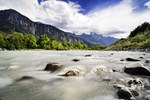Media releases
Nature providing services in the Alps
In the Alpine space too, ecosystem services make a significant contribution to the local quality of life. Springs that provide clean drinking water, trees that ensure a pleasant microclimate in the city, or simply the views of a landscape that prompts us to dream – all of these goods and services can be categorised under the concept of ecosystem services.
The AlpES (Alpine Ecoystem Services) project is devoted to Alpine ecosystem services and aims to strengthen their importance and appreciation in regional and trans-national environmental policies. Ten partners from France, Germany, Italy, Liechtenstein, Austria and Slovenia participated in the project, which will end in December 2018. The AlpES partner organisations include public research institutions, administrative bodies and a private environmental planning and consulting company.
When forests protect
In Liechtenstein one focus is on the protective function of forests against avalanches, mudslides and rock falls. Heike Summer of Liechtenstein’s Office for the Environment highlights the particular importance of this ecosystem service for the Principality: «A large proportion of our forests are located on hillsides. Intact protective forests therefore make an indispensable contribution to reducing the potential for damage, both in the Rhine Valley and in mountain regions, as well as reducing the need to construct additional technical measures.»
WebGIS map providing an overview
One of the project goals was to develop a freely accessible WebGIS map that displays an overview of ecosystem services in the Alps. The data collected from all test regions has been fed into the system and users can select among eight different ecosystem indicators. The view changes according to the selection of these indicators. The map can be accessed at www.alpes-webgis.eu (en).
Understanding ecosystem services and decision making
Consulting the map also shows where there is a need for action; for example, in the Austrian municipality of Hallstatt there is a protection forest against landslides and avalanches.
A further example is the large fresh water consumption in metropolitan areas on the edges of the Alps, such as in Milan, or in touristic regions with ski resorts, where drinking water is used for artificial snow-making.
Findings like these form a sound basis for political and economic decision-making.
Programme of the Final Conference in Innsbruck
Markus Reiterer, the Secretary General of the Alpine Convention, will open the Final Conference organised by AlpES and the SPARE Project (Strategic Planning for Alpine River Ecosystems) on Wednesday November 21st at 17:00.
Visitors can learn more about the participating test regions at info stands. On Thursday November 22nd from 9:00 onwards, the lead partners from AlpES and SPARE will shortly present their projects, followed by talks and workshops. Press representatives are kindly invited on both days.
Date: 21st November 2018 (17:00-20:00), 22nd November 2018 (9:00-17:00)
Venue: Haus der Begegnung, Rennweg 12, 6020 Innsbruck, Austria
Registration: https://ec.europa.eu/eusurvey/runner/FinalEvent2018-AlpES-SPARE
About AlpES: www.cipra.org/en/alpes, www.alpine-space.eu/AlpES (en)
For further questions please contact:
Robin Naumann
Project Manager CIPRA International, +423 237 53 53 08, [email protected]
| Type | Title |
|---|---|

|
181002_MM_AlpES_en.pdf |



